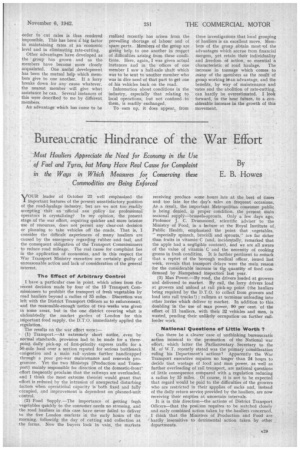BureaLcratic Hindrance of the War Effort
Page 31

If you've noticed an error in this article please click here to report it so we can fix it.
Most Hauliers Appreciate the Need for Economy in the Use
• of Fuel and Tyres, but Many Have Real Cause for Complaint By in the Ways in Which Measures for Conserving these E. B. Howes Commodities are Being Enforced YOUR leader of October 23 well emphasized the important features of the present unsatisfactory position of the road-haulage industry, but are we not too readily accepting that an official axe policy for professional operators is crystalizing? In my opinion, the present stage of the war effort, requiring quicker and more intense use of resources, does not permit any clear-cut decision or planning to take vehicles off the roads. That is, I consider the difficult experiences of many hauliers are caused by the emergency regarding rubber and fuel, and the consequent obligation of the Transport Commissioners to reduce road mileage. The real cause for complaint lies in the application of economies, and in this respect the War Transport Ministry executive are certainly guilty of unreasonable action and lack of consideration of the general interest.
The Effect of Arbitrary Control I have a particular case in point, which arises from the recent decision made by four of the 13 Transport Commissioners to prohibit the transport of fresh vegetables by road hauliers beyond a radius of 35 miles. Discretion was left with the District Transport Officers as to enforcement, and the reasonable-enough notice of two weeks was given in some areas, but in the one district covering whit is undoubtedly the market garden of London for this important food supply, the D.T.O. immediately applied the regulation.
The results on the war effort were :
(1) Transport.—At extremely short notice, even by normal standards, provision had to be made for a threepoin,t. daily pick-up of first-priority express traffic for a 50-mile haul over a section reputed for serious bottleneck congestion and a main rail system further handicapped through a poor pre-war maintenance and renewals programme. Yet the two Ministeps (Production and Transport) mainly responsible foi direction of the domestic-fronteffort frequently proclaim that the railways are overloaded, and I think the most extreme theorist would grant that effort is reduced by the intrusion of unexpected disturbing factors when operational capacity is both fixed and fully cccupied, and improvement is dependent on planned-unit control.
(2) Food Supply.—The importance of getting fresh vegetables quickly to the consumer needs no stressing, and the road hauliers in this case have never failed to deliver to the five London markets in the early hours of the morning, followidg the day of cutting and collection at the farms. Now the buyers look in vain, the markets
receiving produce some hours late at the best of times and too late for the day's saleF. on frequent occasions. As a result, the important Metropolitan consumer public is being denied, in proper condition, the present main seasonal supply—brussels-sprouts. Only a few days ago, Professor J. C. Drummond, scientific adviser to the Ministry of Food, in a lecture at the Royal Institute of Public Health, emphasized the point that vegetables, "especially spinach, brocialli and sprouts," are far richer than fruits in vitamin C (and, incidentally, remarked that the apple had a negligible content), and we are all aware of the value of vitamin C and the necessity of cooking greens in fresh condition. It is further pertinent to remark that a report of the borough medical officer, issued last week, reveals that transport delays were the main reason for the considerable increase in the quantity of food condemned by Hampstead inspectors last year.
(3) Man Power.—By road, the drivers loaded at growers and delivered to market. By rail, the lorry drivers load at growers and unload at rail pick-up point (the hauliers being required by the D.T.O. to collect from growers and load into rail trucks!) ; railmen at terminus unloading into other lorries which deliver to market. In addition to this. doubling in the use of man power, 90 per cent, of the effort of 11 hauliers, with their 32 vehicles and men, is wasted, pending their unlikely occupation on further railfeeder work.
National Questions of Little Worth ?
Can there be a clearer case of unthinking bureaucratic action inimical to the promotion of the National war effort, which latter the Parliamentary Secretary to the M. of W.T. recently stated was the primary consideration ruling his Department's actions? Apparently the War Transport executive requires no longer than 24 hours to deride that wastage of food and man power, as well as further overloading of rail transport, are national questions of little consequence compared with a regulation reducing a radius by 15 miles. Of course, it is not to be expected that regard would be paid to the difficulties of the growers who are restricted in their sppplies of sacks and, instead of the daily return service provided by the hauliers, are now receiving their empties at uncertainintervals.
It is in this direction—the actions of District Transport Officers—that the posiLion requires to be watched closely and early combined action taken by the hauliers concerned. I think that the Ministers of Production and Food are hardly insensitive to detrimental action taken by other departments.




















































